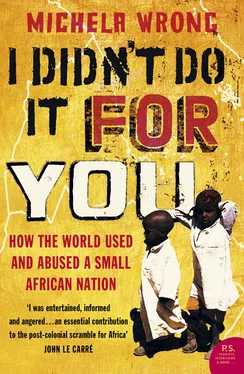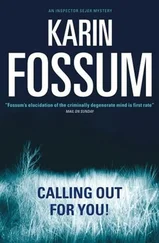This was a nation of citizens with bits missing. Often, at the end of a conversation, I would rise to my feet only to register, as the man I had been talking to escorted me to the door, that he walked with the lunging awkwardness of someone with an artificial leg. The hand I was shaking, Iâd realize, was short of a finger or two, the eye that had failed to follow my movements, or was watering painfully, was probably made of glass. The capital was full of young men and women on crutches, one empty trouser leg flapping in the breeze. If they were lucky, they sat at the controls of motorized wheelchairs, provided by a government mindful of the debt it owed its tegadelti . Of an evening in Asmara, you could sometimes spot a lone amputee whizzing down Martyrsâ Avenue at breakneck speed, determinedly propelling his wheelchair towards Asmaraâs nightspots with two flailing sticks; an African skier without snow.
It was difficult not to be moved. It was difficult not to be admiring. My reaction was far from unique. When it came to falling for Africaâs 53rd and newest state, hundreds of well-intentioned Westerners had already beaten me to it.
There is a breed of expatriate that seems particular to the Horn of Africa. Foreigners who, quite early in their travels, discovered Ethiopia or Eritrea and fell in love, with all the swooning, uncritical absolutism of youth. Perhaps they had ventured elsewhere in Africa and didnât like what they found: the inferiority complexes left by an oppressive colonial past, menacing hints of potential anarchy, the everyday sleaze of failing states. Then they came to the Horn and were swept away by the uniqueness of the regionâs history, the sophistication of their Ethiopian and Eritrean friends. They marvelled at the dedication of puritanical leaderships trying to do something more creative than fill Swiss bank accounts, and became True Believers. âAh yes, so-and-so. He has always been a Friend of Ethiopia,â you would often hear officials in Asmara and Addis say. âHave you read so-and-soâs book? Sheâs a true Friend of Eritrea.â The rebels-turned-ministers had grasped a vital truth. True Believers are worth a hundred spokesmen to guerrilla organizations and the cash-strapped governments they go on to form. Sharing the religious convertâs belligerent frustration with those who have not seen the light, quicker than the locals to detect a slight, they are tireless in defending the cause. During their time in the bush, both the EPLF and Ethiopiaâs Tigrayan Peopleâs Liberation Front (TPLF) had acquired a coterie of them: hard-working Swedish aid workers, idealistic human rights activists, self-funded journalists and left-wing European parliamentarians. They had remained loyal during the hard times and now revelled in the sight of their old friends, once regarded as tiresome nuisances by Western governments, holding executive power on both sides of the border.
By the time I left Asmara, I was well on the way to joining their ranks. Looking back, I know I would have been less susceptible to Eritreaâs tragic charms had I spent less time reporting on the horrors of central Africa. Having gorged on gloomy headlines, I was hungry for what seemed increasingly impossible: an African good news story. I was used to guerrilla groups who raped, pillaged, even â occasionally â ate their victims, whose gunmen were despised by the communities they claimed to represent. In Eritrea you could hear the hushed awe in civiliansâ voices when they talked about the demobilized Fighters who had won them independence and were now trying to build a society freed from the stifling constraints of tribe, religion and gender. As a white woman, I was used to being shooed to the front of queues, paid the exaggerated respect that spoke of generations of colonial browbeating. It gave me a perverse thrill to hear an Eritrean student confess that he and his fellow citizens suffered from a superiority complex towards outsiders. In other African nations, I was accustomed to being refused interviews by government ministers terrified by the possibility that they might show some spark of individual intelligence that could later be judged to have undermined the omniscient Big Man. Here ministers not only spoke to me, they strayed with confidence outside their official briefs and showed a disconcerting habit of wanting to discuss Samuel Pepys and Charles Darwin. I was used to writing about supplicant African governments moaning over conditions placed on aid by the World Bank and International Monetary Fund, dependent on Western approval for every policy change. These men told me, in tones that brooked no dissent, that having won independence on its own, Eritrea would decide its development programme for itself. The advice of strangers was neither wanted nor needed: self-reliance was the watchword.
In the Field, the EPLF had eschewed ranks, and the personality cults that were de rigueur elsewhere in Africa were regarded with fastidious disapproval. What a relief, after seeing portraits of Moi and Mobutu above every shop counter, to hear an Eritrean, driving past a window displaying a rare photograph of Eritrean President Isaias Afwerki, âtskâ disapprovingly and say: âI really donât like that.â Rather than building a palace, Isaias still lived in a modest Asmara home donated by the government. He wore simple safari suits, not Parisian couture. Visiting journalists were granted interviews within a day of arrival (in my years of visiting I had four); here was none of the scripted inaccessibility of the leader hiding behind his fawning courtiers. As for the blaring motorcades favoured by his contemporaries, shoppers on Liberation Avenue would sometimes register with a start that the man they had just passed, walking quietly along on his own, was their head of state. Isaias was in the habit of rising from the table at the end of official receptions and â to the horror of scrambling bodyguards â asking guest presidents to join him on one of his unscheduled strolls around Asmara. While foreign investors raved about the absence of official corruption, the stiff-backed integrity of those in government, Western capitals hailed Isaias and his freshly-instated friend across the border, Ethiopian Prime Minister Meles Zenawi, as forming the core of a new group of principled leaders spearheading a much-needed African Renaissance. The two men had worked together as rebel leaders â they were rumoured to be distantly related â and future cooperation seemed assured. With this visionary duo at the helm, what could go wrong? The Horn seemed destined for an unprecedented era of stability and prosperity.
The country was awash with Soviet and American weaponry, yet crime was almost unknown. The most dangerous thing that could happen to you in Asmara after dark was to stumble on a piece of broken paving. Ironically, a capital that had witnessed so much violence was blessed with an extraordinary tranquillity, it breathed peace in time with the cicadaâs rhythmic rasp. Asmara was certainly the only African city in which not only was I regularly offered lifts by strangers, but I accepted them without hesitation. I joined diners who gestured me over to their tables in restaurants and cleared a seat for customers who decided, off their own bat, that they fancied sharing a coffee. As for begging, it was regarded as below Eritrean dignity. I saw a persistent beggar boy being given a reproving cuff round the ear from an ex-Fighter mortified by the impression he was making on a visitor. Oneâs expectations were always being turned on their head. âHave you got any local money?â a handsome Eritrean student who had shared my flight asked as we were about to leave the airport terminal. Before I had time to mutter a refusal, he had extracted a banknote from his wallet: âHere, take this for the taxi. You can pay me back later.â It was a typically Eritrean moment: in one of the worldâs poorest nations, I had just become the scrounger.
Читать дальше












